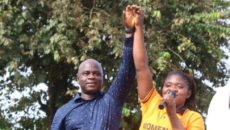House Speaker J. Emmanuel Nuquay recently made statements suggesting that he supports a dual citizenship clause being added to the Liberian constitution.
“If other countries are doing it, including our neighbors, and are developed and developing, why [can we not] accept dual citizenship?†Nuquay was quoted as saying.
While the constitution appears silent on the issue, Liberia’s Aliens and Nationality Act stipulates that Liberians who acquire an additional citizenship from another country automatically lose their Liberian citizenship.
The decision of whether or not to acquire citizenship in a foreign country is one that many Liberians who now live abroad face. On one end, there are jobs and educational opportunities that could be gained by taking on the citizenship of a foreign country. However, when that means automatically renouncing one’s Liberian citizenship, Liberians abroad can lose certain birthrights including voting rights and visa-free travel.
I recently sat down with two young Liberians based in the United States who are debating whether or not to swap their Liberian citizenship for a U.S. passport. Both are students at a top-40 university. They have each been in the U.S. for over a decade.
Nicole, who studies nursing, has had the opportunity to work at prestigious hospitals across the country while Randolph, who studies economics and business administration, has worked for fortune 500 companies. I haven’t used their actual names in order to grant them the ability to speak freely about a sensitive issue.
Both of them have been delaying the process of naturalizing in the U.S. because of their uncertainty in balancing the benefits of carrying an American passport with the perceived loss of their birthrights as Liberians.
Our conversation, which was edited for clarity, follows:
Nicole: Liberia doesn’t give dual citizenship, which doesn’t make sense because Liberia was founded by people from here so I don’t understand why they wouldn’t feel a connection.
Randolph: Ever since the whole Liberian civil war and the new establishment coming into power, there’s a huge wave of people who think that people who escaped the civil war and came to the States will go back and steal their jobs. So they’re against it every time it comes up.
Nicole: So basically, it’s similar to what Americans fear. They’re thinking, “All the immigrants are going to come here and steal our jobs.â€
Torli: So why do you guys want to keep your Liberian citizenship? What’s in it for you?
Randolph: Think about it, it could only benefit Liberia.
Nicole: You’ve got to understand. As a U.S. citizen, you’re making a statement to other countries, especially other developed nations. Me having a Liberian citizenship, it’ll allow me to not get the “oh, you’re American†treatment and I’ll be treated differently. I want to be able to travel to other places without being recognized as an American.
Torli: But then you want to be able to switch when you want to travel to other countries and claim the American citizenship?
Nicole: Of course! That’s the only benefit to being an American.
Randolph: No, that’s not the only benefit. You can vote, you can participate in democracy.
Torli: What would you tell Liberians who view you as a threat?
Randolph: We can only benefit Liberia.
Torli: By taking their jobs?
Nicole: We’re going to help make Liberia great again. [Laughter]
Randolph: That’s true though.
Torli: How will you make Liberia great again if you take their jobs?
Nicole: I’m not taking anybody’s job but if I take one job, I can at least try to create others with my knowledge. I studied here and I’ll acquire some useful skills before going back – what jobs are we even talking about?
Randolph: A large population of Liberia are functionally illiterate. So for people like us who are skilled, it should be intuitive to put us in positions where we can make an impact. But what I see in Liberia is there’s just a whole lot of corruption and people who are just in it for their own benefit. If I come and study here and want to take my skills to go back and help my people, not allowing me to be a citizen limits my ability to help my people. What if I want to run for office because I see things I want to change and policies I want to implement?
Nicole: And what if I want to vote for him? How am I going to be able to do that?
Torli: So, one of the concerns is creating a class of citizens who were fortunate enough to travel to the US…
Randolph: But that already exists. There is already a class of people who are at the top of Liberia who had that privilege. There really isn’t a middle class. It’s either that you’re up here or you’re down.
Torli: But the main concern is, why should we exacerbate this problem? If we let them get dual citizenship, they’ll be able to dominate even more.
Nicole: When you’re thinking like that, you’re already in a box and limiting yourself because you’re not thinking of the possibilities of how this can help me. You’re already thinking, how is this going to hurt me? Have you thought about how people from here can help people who are over there?
Randolph: I have this theory about Liberia. I think in Liberia, corruption starts at the lowest level – say, in elementary school. Corruption in Liberia is in every single level of life. If you go to school and you’re not that smart, you can pay your teachers and your teachers can give you a good grade. So, if you’re an individual who’s paid your way through school and you’ve finally gotten a position, all that money you’ve paid, you want to get it back now. So you use up the people’s resources and tax money…
Nicole: I didn’t even know they pay taxes there.
Randolph: I’ve heard about how Liberian government officials get paid more than officials here. It doesn’t make sense!
Nicole: They’re not doing anything. All that money should be going towards improving the system.
Torli: But what does that have to do with you being given dual citizenship?
Nicole: It’s because they don’t want us to be able to come there and stop that.
Torli: It’s interesting that you say that because there’s been a couple of Liberians who have left here and gone back as the ‘qualified and educated’ Liberians and they were involved in corruption.
Nicole: Just because you’re from here and you go there, it doesn’t mean you won’t be involved in corruption, but you can’t generalize like that.
Torli: Well, you guys have done a lot of generalizing here.
Nicole: With knowledge comes great responsibility and it’s up to you as an individual who was brought up right to know what to do and if you only have your own self-interests at heart then obviously you’re only going to be there for corruption.
Torli: Ok, if you really have Liberia at heart, what is it that you wouldn’t be able to do if you got American citizenship?
Nicole: If I wanted to go back home to open a hospital – to be honest, I’m not really up-to-date on everything that’s going on there…
Randolph: I’m not really well-versed in how the lack of dual citizenship limits me, but I know that there are a lot of limitations.
Torli: So you just don’t want there to be any limits?
Nicole: Yes, why limit those who are trying to go back and help their country to make it better?
Randolph: Why would you take away my right as a Liberian?
Nicole: We’re just as Liberian as you are.



